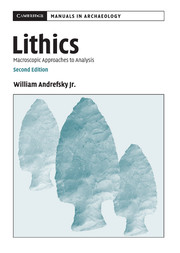Book contents
- Frontmatter
- Contents
- List of figures
- List of tables
- Preface
- Preface to second edition
- Acknowledgments
- 1 A brief introduction to lithic analysis
- 2 Basics of stone tool production
- 3 Lithic raw materials
- 4 Getting started in lithic analysis: identification and classification
- 5 Flake debitage attributes
- 6 Approaches to debitage analysis
- 7 Approaches to stone tool analysis
- 8 Artifact diversity and site function
- 9 Lithic analysis and prehistoric sedentism
- 10 Conclusion
- Glossary
- References
- Index
Preface to second edition
Published online by Cambridge University Press: 05 June 2012
- Frontmatter
- Contents
- List of figures
- List of tables
- Preface
- Preface to second edition
- Acknowledgments
- 1 A brief introduction to lithic analysis
- 2 Basics of stone tool production
- 3 Lithic raw materials
- 4 Getting started in lithic analysis: identification and classification
- 5 Flake debitage attributes
- 6 Approaches to debitage analysis
- 7 Approaches to stone tool analysis
- 8 Artifact diversity and site function
- 9 Lithic analysis and prehistoric sedentism
- 10 Conclusion
- Glossary
- References
- Index
Summary
The first edition of Lithics was written in 1994, with only slight modifications and additions during the review and printing phases. Over the past decade a great deal of research in lithic analysis has emerged. I like to believe that some of that research was developed in response to issues and concerns raised in the first edition.
The second edition of Lithics draws upon some of the new research in an effort to update aspects of thinking about various topics and analytical procedures. Even though the structure of the book remains the same, I have embedded materials and discussion on a number of new topics not included in the first edition: minimal nodule analysis, flake tool reduction indices, microdebitage studies, and the relationship of research questions to analytical procedures. The total number of citations has increased by about a third, with most of the new materials being written after 1994. The second edition still focuses upon macroscopic approaches to analysis. However, a section on microscopic techniques of analysis dealing with artifact function has been added (thanks to the many friends who convinced me that such a section was needed).
One of the things that becomes immediately apparent when gathering materials for a second edition of a book like Lithics is the shifting influences and contributions of various scholars. I acknowledge the research efforts of those individuals whom I have drawn upon in pulling this edition together.
- Type
- Chapter
- Information
- LithicsMacroscopic Approaches to Analysis, pp. xxi - xxiiPublisher: Cambridge University PressPrint publication year: 2005



